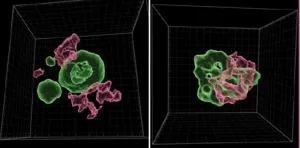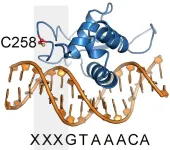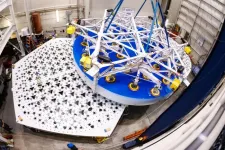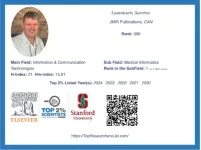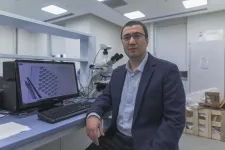(Press-News.org) A critical transition in early human development is regulated not by our own genes, but by DNA elements called transposons that can move around the genome, Sinai Health researchers have found.
This remarkable discovery challenges our previous understanding of these elusive DNA segments, shedding new light on the roles they play in human development and disease.
“People tend to think of transposons as akin to viruses where they hijack our cells for the sole purpose of propagating themselves,” says study’s senior co-author Dr. Miguel Ramalho-Santos, Senior Investigator at the Lunenfeld-Tanenbaum Research Institute (LTRI), part of Sinai Health, and Professor at the Department of Molecular Genetics at the University of Toronto.
“But here we have discovered that these elements are not mere genomic parasites but are essential for early development,” said Dr. Ramalho-Santos, who holds the Canada 150 Research Chair in Developmental Epigenetics.
Their study, published in the journal Developmental Cell, indicates that transposable elements are critical to ensure that human embryonic cells progress normally through early development, rather than going back in time.
The researchers focussed on the transposable elements known as LINE-1, for long interspersed nuclear element-1. Unlike our own genes, which compose less than 2% of our genome, the LINE-1elements comprise a staggering 20% of the genetic material in our cells. Some of LINE-1 elements can amplify and move around the genome, inserting themselves in new locations. Because they spread of their own accord in a way that can disrupt normal gene functions, this has earned them the moniker of “selfish DNA”.
For years, scientists believed these elements were mostly harmful, occasionally wreaking havoc in the genome and contributing to a variety of diseases, from hemophilia to neurological disorders and cancer.
Dr. Juan Zhang, a senior co-author and postdoctoral fellow who spearheaded the research, initially found it intriguing that LINE-1 RNA messages are abundant in early embryo. RNA message molecules are transcribed from parts of the genome that are active, indicating that LINE-1 elements are switched on in these critical early stages.
“If transposons are bad and dangerous, why do we see them active in the early embryo? This is an embryo that's just beginning its formation. Any dangerous insertion into the genome at this point is going to be propagated throughout the rest of the development of the individual,” said Dr. Zhang.
When Dr. Zhang inhibited LINE-1 expression in cultured human embryonic stem cells (ESCs), a reversal occurred, taking them back to the more primitive 8-cell stage. At this point, each of the eight cells is identical and totipotent, capable of developing into both the embryo and placenta. However, beyond this stage, while ESCs can still form all fetal cells, they become less and less able to contribute to the placenta, through which the embryo receives nutrients from the mother.
Further experiments showed that these LINE-1 message molecules act as a scaffold to organize the DNA in the 3D space of the cell’s nucleus. They help move chromosome 19—home to crucial genes for the 8-cell stage—to a gene-silencing region of the nucleus, ensuring the embryo can progress to subsequent stages without a glitch.
“We show that LINE-1 regulates gene expression at a crucial turning point where the embryo starts to specialize its cells for various functions. Our results indicate that this not an accidental occurrence but a vital evolutionary mechanism,” said Dr. Zhang.
Adding to the surprises, this new role of LINE-1 elements deviates from their typical behaviour of jumping to new genomic locations and thereby causing potentially harmful mutations. Instead, in this critical context, LINE-1 elements exclusively foster developmental progression, a unique action that underscores their importance in early human growth.
This fundamental research has important implications for fertility treatments and the use of stem cells in regenerative medicine. Moreover, this work unveils novel roles for LINE1 that can now be explored in the disease contexts where it has been implicated, from neurological disorders to cancer.
Dr. Anne-Claude Gingras, Director of LTRI and Vice President of Research for Sinai Health has said, “This research underscores just how much more there is to learn, not only about human development but also about these enigmatic genome elements whose roles are only beginning to emerge. I congratulate my colleagues on breaking new ground with this fascinating insight into human biology, and I eagerly anticipate further discoveries as they continue their work.”
This research was supported by funding from the Canadian Institutes for Health Research, the Great Gulf Homes Charitable Foundation and the Medicine Design initiative at the University of Toronto.
END
Scientists unveils key role of “selfish DNA” in early human development
2024-10-15
ELSE PRESS RELEASES FROM THIS DATE:
Bonobos may be more vulnerable than previously thought, suggests genetics study
2024-10-15
Bonobos, endangered great apes that are among our closest relatives, might be more vulnerable than previously understood, finds a genetics study led by a UCL researcher that reveals three distinct populations.
The three groups of bonobos have been living separately in different regions in Central Africa for tens of thousands of years, according to the study published in Current Biology by an international research team co-led by UCL, University of Vienna, and Max Planck Institute for Evolutionary Anthropology ...
Scripps Research scientists discover chemical probes for previously “undruggable” cancer target
2024-10-15
LA JOLLA, CA—Hormone-driven cancers, like those of the breast and prostate, often rely on a tricky-to-target protein called Forkhead box protein 1 (FOXA1). FOXA1 mutations can enable these types of cancers to grow and proliferate. Today, FOXA1 is notoriously difficult to block with drugs—but that may soon change.
Scripps Research scientists have identified a crucial binding site on FOXA1 that could pave the way for future cancer treatments. The team’s findings, which were published in Molecular Cell on October 15, 2024, also mapped out how tiny drug-like chemical compounds—called small molecules—interact with the protein.
While ...
Giant Magellan telescope begins primary mirror support system testing
2024-10-15
TUCSON, AZ — October 15, 2024 — The Giant Magellan Telescope today announced the successful installation of one of its completed 8.4-meter-diameter primary mirrors into a support system prototype at the University of Arizona’s Richard F. Caris Mirror Lab. This highly sophisticated system — comparable in size to half a basketball court and containing three times the number of parts of a typical car — is vital to the telescope’s optical performance and precision control. The milestone marks the start of a six-month optical testing phase to demonstrate that the support system can control the mirror as required, validating the revolutionary capabilities ...
Experimental cancer drug eliminates bone metastases caused by breast cancer in lab models
2024-10-15
In a new study led by Johns Hopkins Medicine, the drug RK-33 has demonstrated promise in treating breast cancer that has spread to the bone (breast cancer bone metastasis). RK-33 was previously shown to help treat other types of cancer and viral illnesses.
Patients with breast cancer and bone metastasis have limited treatment options and often rely on palliative care to ease difficult symptoms, including frailty and pain. In most cases, breast cancer with bone metastasis is incurable.
Now, corresponding author Venu Raman, Ph.D., ...
Political candidates who fight climate change stand to benefit in election
2024-10-15
A majority of Floridians expressed support for political candidates who fight climate change in a new Florida Atlantic University survey. The survey found that nearly 52% of respondents agreed that a candidate with a record of reducing climate impacts was more likely to get their vote.
The Invading Sea’s Florida Climate Survey also revealed strong support in the state for increasing renewable energy use and teaching climate science in K-12 classrooms. The survey is the 11th conducted by the FAU Center for Environmental Studies ...
Stand up to Cancer announces new grants supporting pioneering research in six cancer types
2024-10-15
LOS ANGELES – Oct. 15, 2024 – Stand Up To Cancer® (SU2C) today announced grants to several teams of leading cancer investigators in support of cutting-edge research in a variety of cancers including head and neck, pediatric, pancreatic, breast, rectal and gastro-esophageal cancers, as well as research focused on how the microbiome communicates with the immune system.
“These new grants emphasize SU2C’s support of collaborative, trailblazing research that pushes the field forward and helps people impacted by some of the most common or difficult-to-treat cancers,” said Julian Adams, Ph.D., president and CEO of SU2C. “With an emphasis on answering ...
Researchers awarded $1.3M to help military Veterans battling Acute Myeloid Leukemia
2024-10-15
CLEVELAND—With a new four-year, $1.3 million grant from the U.S. Department of Veterans Affairs, researchers at Case Western Reserve University are investigating a new approach to treat Acute Myeloid Leukemia (AML) in military Veterans.
AML is the most common form of blood cancer in adults, and many patients suffer relapses—especially Veterans, due to exposure to harmful chemicals and radiation during active duty, according to the National Center for Biotechnology Information.
There is no effective treatment for AML and, according to the National Institutes of Health, half of treated patients suffer a relapse after therapy—mainly ...
New hub for high-energy astrophysics — CTAO Science Data Management Centre opens at DESY in Zeuthen
2024-10-15
Zeuthen, Germany – On 14 October 2024, the Cherenkov Telescope Array Observatory (CTAO), along with hosting partners and shareholders Deutsches Elektronen-Synchrotron DESY, celebrated the official inauguration of the Science Data Management Centre (SDMC) on the DESY campus in Zeuthen, Germany.
The ceremony, chaired by Prof. Christian Stegmann, Head of DESY Zeuthen, was opened by Mario Brandenburg, Parliamentary State Secretary at the German Federal Ministry of Education and Research (BMBF), and Tobias Dünow, State Secretary at ...
JMIR publications CEO and Executive Editor Gunther Eysenbach achieves #1 ranking as most cited researcher in Medical Informatics for fifth consecutive year
2024-10-15
Toronto, ON (October 14, 2024) – JMIR Publications is proud to announce that Gunther Eysenbach, founder, CEO and executive editor, has once again been named the #1 most cited researcher in the subfield of medical informatics by Stanford/Elsevier’s Top 2% Scientists rankings. This marks the fifth consecutive year that Dr Eysenbach has secured this prestigious position, reaffirming his status as a leading authority and driving force in the field. He is also ranked #36 in the Top 100 Scientists in Information & Communication ...
ERC grant for groundbreaking wearable health tech
2024-10-15
Dr. Levent Beker from the Department of Mechanical Engineering at Koç University, once again received European Research Council (ERC) support for his scientific research that focuses on improving the quality of our daily lives.
His previous project on an implant that can detect signs of heart failure and degrade in the body without surgery was granted €2.5 million Starting Grant from the ERC. Last year, his research on a wireless micro sensor that enables real-time monitoring of food spoilage at supermarkets, was published in Nature FoodMagazine.
Currently leading the Bio-integrated ...
